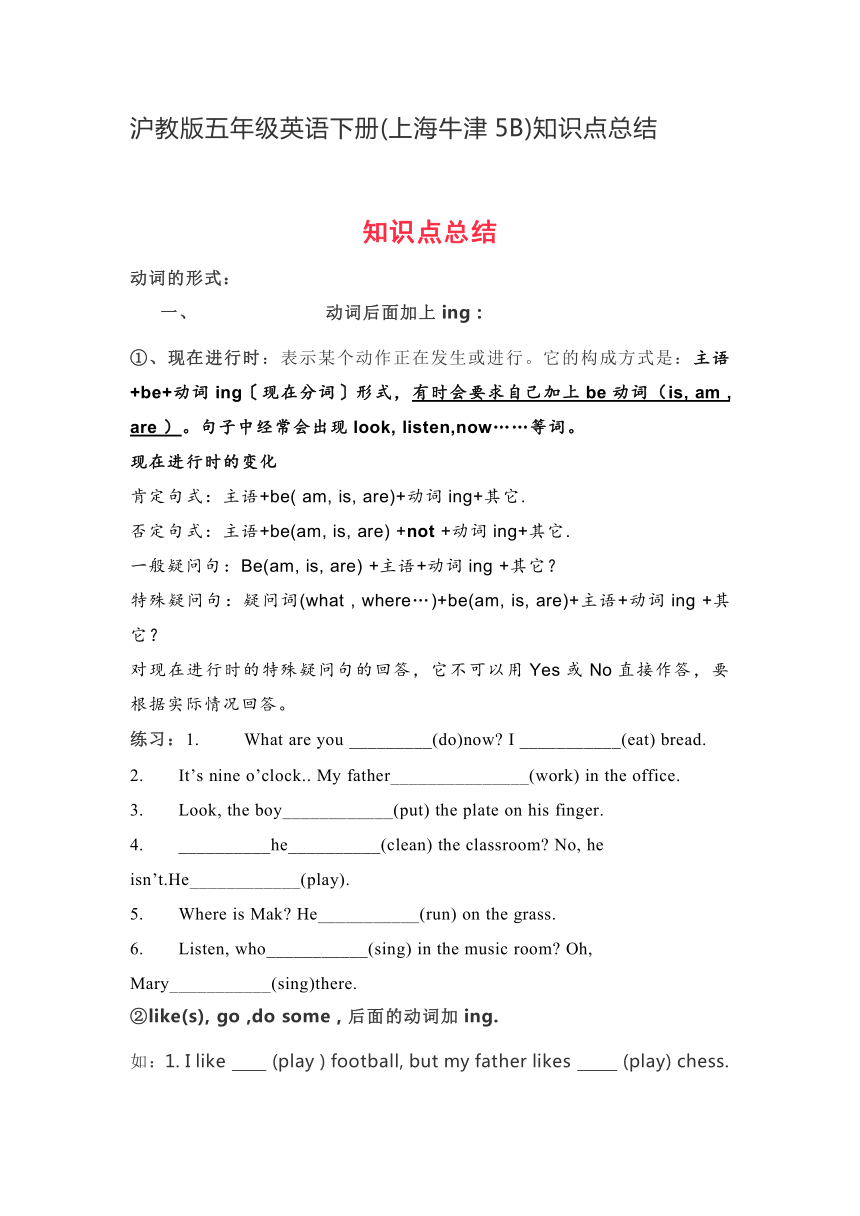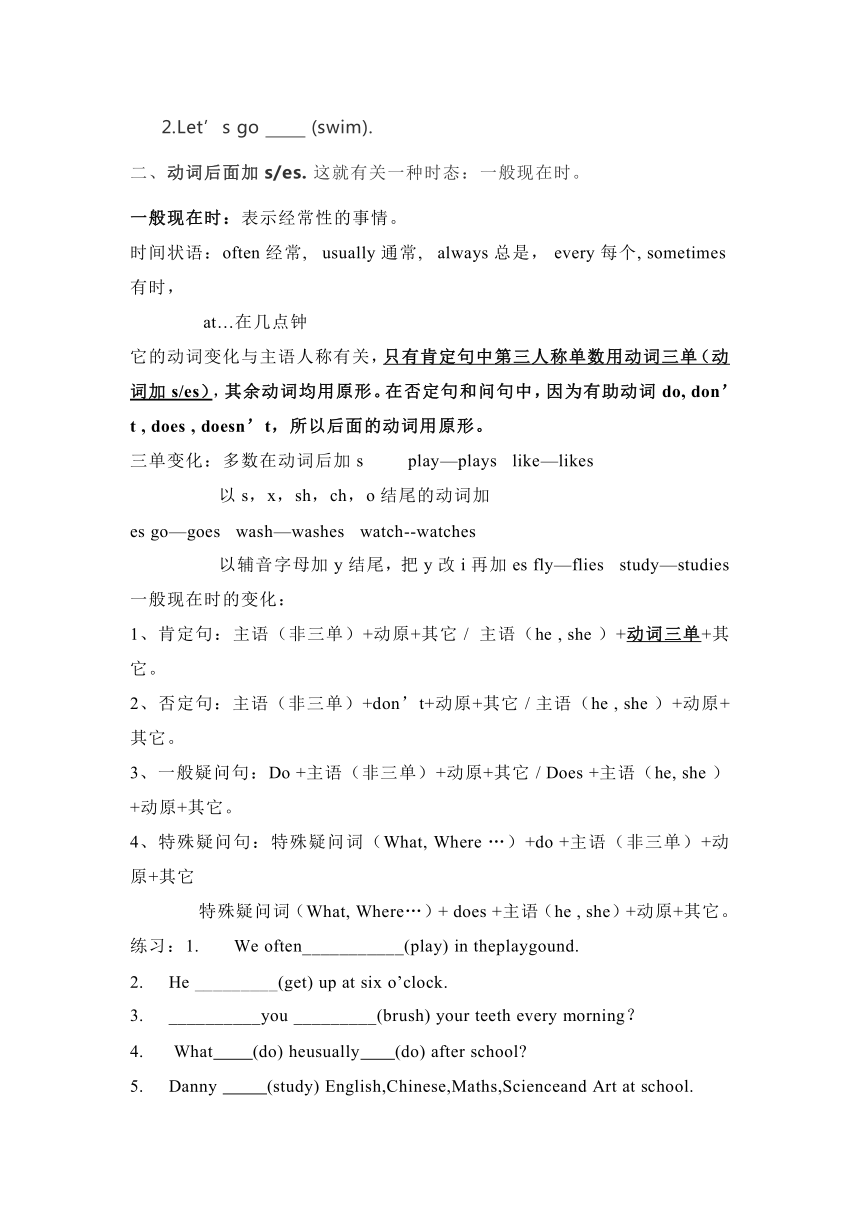牛津沪教版小学英语五年级下册知识点总结
文档属性
| 名称 | 牛津沪教版小学英语五年级下册知识点总结 |  | |
| 格式 | zip | ||
| 文件大小 | 12.3KB | ||
| 资源类型 | 教案 | ||
| 版本资源 | 牛津沪教版 | ||
| 科目 | 英语 | ||
| 更新时间 | 2019-05-13 13:14:12 | ||
图片预览


文档简介
沪教版五年级英语下册(上海牛津5B)知识点总结
知识点总结
动词的形式:
一、????????????动词后面加上ing :
①、现在进行时:表示某个动作正在发生或进行。它的构成方式是:主语+be+动词ing〔现在分词〕形式,有时会要求自己加上be动词(is, am , are?)。句子中经常会出现look, listen,now……等词。
现在进行时的变化
肯定句式:主语+be( am, is, are)+动词ing+其它.
否定句式:主语+be(am, is, are) +not?+动词ing+其它.
一般疑问句:Be(am, is, are) +主语+动词ing +其它?
特殊疑问句:疑问词(what , where…)+be(am, is, are)+主语+动词ing +其它?
对现在进行时的特殊疑问句的回答,它不可以用Yes或No直接作答,要根据实际情况回答。
练习:1.??????? What are you _________(do)now? I ___________(eat) bread.
2.???????It’s nine o’clock.. My father_______________(work) in the office.
3.???????Look, the boy____________(put) the plate on his finger.
4.???????__________he__________(clean) the classroom? No, he isn’t.He____________(play).
5.???????Where is Mak? He___________(run) on the grass.
6.???????Listen, who___________(sing) in the music room? Oh, Mary___________(sing)there.
②like(s), go ,do some ,?后面的动词加ing.
如:1. I like????????(play ) football, but my father likes?????????(play) chess.
2.Let’s go?????????(swim).
二、动词后面加s/es.?这就有关一种时态:一般现在时。
一般现在时:表示经常性的事情。
时间状语:often经常, ?usually通常, ?always总是,?every每个, sometimes有时,
?at…在几点钟
它的动词变化与主语人称有关,只有肯定句中第三人称单数用动词三单(动词加s/es),其余动词均用原形。在否定句和问句中,因为有助动词do, don’t , does , doesn’t,所以后面的动词用原形。
三单变化:多数在动词后加s?????????play—plays? like—likes
??????????????? ?以s,x,sh,ch,o结尾的动词加es?go—goes? wash—washes? watch--watches
??????????????? ?以辅音字母加y结尾,把y改i再加es?fly—flies? study—studies
一般现在时的变化:
1、肯定句:主语(非三单)+动原+其它?/??主语(he , she?)+动词三单+其它。
2、否定句:主语(非三单)+don’t+动原+其它?/?主语(he , she?)+动原+其它。
3、一般疑问句:Do +主语(非三单)+动原+其它?/ Does +主语(he, she?)+动原+其它。
4、特殊疑问句:特殊疑问词(What, Where?…)+do +主语(非三单)+动原+其它
??????????????特殊疑问词(What, Where…)+ does +主语(he , she)+动原+其它。
练习:1.????? We often___________(play) in theplaygound.
2.?????He _________(get) up at six o’clock.
3.?????__________you _________(brush) your teeth every morning?
4.??????What????????(do) heusually???????(do) after school?
5.?????Danny??????????(study) English,Chinese,Maths,Scienceand Art at school.
6.?????Mike sometimes __________(go) to the park with his sister.
7.?????At eight at night, she __________(watch) TV with his parents.
8.?????________ Mike________(read) English every day?
9.?????How many lessons_________your classmate________(have) on Monday?
10.?What time_________his mother_________(do) the housework?
11.?What?????????you usually????????(do ) on Sundays ?
12.? He???????????( not like )??????????( drink ) tea .
13. They????????????(not like )???????????( play ) cards.
三、动词用原形的名显特征有:1、在can , can’t, let’s , shall we?后面用原形。
2、助动词do , don’t , does , doesn’t?后面动词用原形。
练习:1、He can?????????( put ) an egg on his mouth .
?????2. Let’s???????????( clean ) thelibrary now.
?????3. Shall we??????????(have ) lunch at eleven o’clock?
?????4. Does your uncle???????????(water) flowers every day ?
总练习:用所给动词的适当形式填空:
1. Wang Bing is??????????????(write) an e-mail to his friend in thestudy.
2. I???????????(play)the piano, my brother???????????(watch)TV now.
3.He can?? ?????(swim), but I????? ???(not),I can???????????(ski).
4.Let’s?????????(go) and???????(play) basketball . ?
5.Shall we????? ???????(clean)the classroom now.
6.I??????(like)???????(skate),my parents?????????(not),they??????(like)?? ??????(swim).
7.Miss Green????????(like)??? ????????(dance) very much.
8.?????????(do)Uncle Wang????? ????(run)fast?
9.GaoShan often??????????????(go)????????????????(swim) in Summer(夏天).
10.Do you?????????(have)???????????(some)??????????(bobby)? Yes, I????????(do).
11???????????(do) your father??????????(watch) TV in the evening?No, he?????????(not).
12.This is Helen??? ?????(speak).
13.Tom usually?????????(play) football after school.
14.He??? ????(live) in a small town near Nanjing.
15.Pingping???????????(write) an e-mail to his friend now.
16.What???????(do) Nancyusually????????(do)?
She usually?????????(grow)flowers .
17. Myfather ___????__(like) that songvery much. He often ___???????__(sing)it.
18.________he ________(watch) TV in the evening? No, he ________
19. Myparents usually________(get) up at 6. My sister _______(get) up at 6:15, and Iusually _________(get) up at 6:30
20._______your father _______(fly) kites over there now? Let me see. Yes, he______. He often ________(fly) kites there. Shall we ______(go) to have a look?
21. My aunt????????????(not like )?????????( cook ).
知识点总结
动词的形式:
一、????????????动词后面加上ing :
①、现在进行时:表示某个动作正在发生或进行。它的构成方式是:主语+be+动词ing〔现在分词〕形式,有时会要求自己加上be动词(is, am , are?)。句子中经常会出现look, listen,now……等词。
现在进行时的变化
肯定句式:主语+be( am, is, are)+动词ing+其它.
否定句式:主语+be(am, is, are) +not?+动词ing+其它.
一般疑问句:Be(am, is, are) +主语+动词ing +其它?
特殊疑问句:疑问词(what , where…)+be(am, is, are)+主语+动词ing +其它?
对现在进行时的特殊疑问句的回答,它不可以用Yes或No直接作答,要根据实际情况回答。
练习:1.??????? What are you _________(do)now? I ___________(eat) bread.
2.???????It’s nine o’clock.. My father_______________(work) in the office.
3.???????Look, the boy____________(put) the plate on his finger.
4.???????__________he__________(clean) the classroom? No, he isn’t.He____________(play).
5.???????Where is Mak? He___________(run) on the grass.
6.???????Listen, who___________(sing) in the music room? Oh, Mary___________(sing)there.
②like(s), go ,do some ,?后面的动词加ing.
如:1. I like????????(play ) football, but my father likes?????????(play) chess.
2.Let’s go?????????(swim).
二、动词后面加s/es.?这就有关一种时态:一般现在时。
一般现在时:表示经常性的事情。
时间状语:often经常, ?usually通常, ?always总是,?every每个, sometimes有时,
?at…在几点钟
它的动词变化与主语人称有关,只有肯定句中第三人称单数用动词三单(动词加s/es),其余动词均用原形。在否定句和问句中,因为有助动词do, don’t , does , doesn’t,所以后面的动词用原形。
三单变化:多数在动词后加s?????????play—plays? like—likes
??????????????? ?以s,x,sh,ch,o结尾的动词加es?go—goes? wash—washes? watch--watches
??????????????? ?以辅音字母加y结尾,把y改i再加es?fly—flies? study—studies
一般现在时的变化:
1、肯定句:主语(非三单)+动原+其它?/??主语(he , she?)+动词三单+其它。
2、否定句:主语(非三单)+don’t+动原+其它?/?主语(he , she?)+动原+其它。
3、一般疑问句:Do +主语(非三单)+动原+其它?/ Does +主语(he, she?)+动原+其它。
4、特殊疑问句:特殊疑问词(What, Where?…)+do +主语(非三单)+动原+其它
??????????????特殊疑问词(What, Where…)+ does +主语(he , she)+动原+其它。
练习:1.????? We often___________(play) in theplaygound.
2.?????He _________(get) up at six o’clock.
3.?????__________you _________(brush) your teeth every morning?
4.??????What????????(do) heusually???????(do) after school?
5.?????Danny??????????(study) English,Chinese,Maths,Scienceand Art at school.
6.?????Mike sometimes __________(go) to the park with his sister.
7.?????At eight at night, she __________(watch) TV with his parents.
8.?????________ Mike________(read) English every day?
9.?????How many lessons_________your classmate________(have) on Monday?
10.?What time_________his mother_________(do) the housework?
11.?What?????????you usually????????(do ) on Sundays ?
12.? He???????????( not like )??????????( drink ) tea .
13. They????????????(not like )???????????( play ) cards.
三、动词用原形的名显特征有:1、在can , can’t, let’s , shall we?后面用原形。
2、助动词do , don’t , does , doesn’t?后面动词用原形。
练习:1、He can?????????( put ) an egg on his mouth .
?????2. Let’s???????????( clean ) thelibrary now.
?????3. Shall we??????????(have ) lunch at eleven o’clock?
?????4. Does your uncle???????????(water) flowers every day ?
总练习:用所给动词的适当形式填空:
1. Wang Bing is??????????????(write) an e-mail to his friend in thestudy.
2. I???????????(play)the piano, my brother???????????(watch)TV now.
3.He can?? ?????(swim), but I????? ???(not),I can???????????(ski).
4.Let’s?????????(go) and???????(play) basketball . ?
5.Shall we????? ???????(clean)the classroom now.
6.I??????(like)???????(skate),my parents?????????(not),they??????(like)?? ??????(swim).
7.Miss Green????????(like)??? ????????(dance) very much.
8.?????????(do)Uncle Wang????? ????(run)fast?
9.GaoShan often??????????????(go)????????????????(swim) in Summer(夏天).
10.Do you?????????(have)???????????(some)??????????(bobby)? Yes, I????????(do).
11???????????(do) your father??????????(watch) TV in the evening?No, he?????????(not).
12.This is Helen??? ?????(speak).
13.Tom usually?????????(play) football after school.
14.He??? ????(live) in a small town near Nanjing.
15.Pingping???????????(write) an e-mail to his friend now.
16.What???????(do) Nancyusually????????(do)?
She usually?????????(grow)flowers .
17. Myfather ___????__(like) that songvery much. He often ___???????__(sing)it.
18.________he ________(watch) TV in the evening? No, he ________
19. Myparents usually________(get) up at 6. My sister _______(get) up at 6:15, and Iusually _________(get) up at 6:30
20._______your father _______(fly) kites over there now? Let me see. Yes, he______. He often ________(fly) kites there. Shall we ______(go) to have a look?
21. My aunt????????????(not like )?????????( cook ).
同课章节目录
- Module 1 Changes and differences
- Unit 1 Tidy up!
- Unit 2 Our new home
- Unit 3 In the future
- Module 2 Work and play
- Unit 4 Reading is fun
- Unit 5 At the weekend
- Unit 6 Holidays
- Module 3 Things we do
- Unit 7 Open day
- Unit 8 Buying clothes
- Unit 9 Seeing the doctor
- Module 4 Things we enjoy
- Unit 10 Great inventions
- Unit 11 Chinese festivals
- Unit 12 The giant's garden
